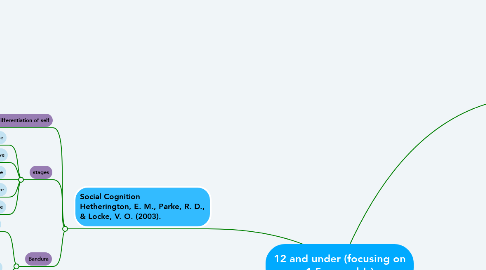
1. Social Cognition Hetherington, E. M., Parke, R. D., & Locke, V. O. (2003).
1.1. differentiation of self
1.1.1. witnessed as early as 2 months old
1.2. stages
1.2.1. egocentric perspective
1.2.2. differentiated perspective
1.2.3. reciprocal perspective
1.2.4. mutual perspective
1.2.5. societal/in-depth perspective
1.3. Bandura
1.3.1. learning by observation and imitation
1.3.2. four sets of processes
1.3.2.1. attention
1.3.2.2. retention
1.3.2.3. reproduction
1.3.2.4. motivation
2. Radical Change Theory Koh, K. & Abbas, A. (2015).
2.1. three core concepts
2.1.1. connectivity
2.1.2. interactivity
2.1.3. access
2.2. more interaction, less passivity
3. Cognitive Development McDevitt, T.M. & Ormrod, J.E. (2013).
3.1. Piaget
3.1.1. kids are motivated learners
3.1.1.1. actively creating/testing/adjusting schemes
3.1.2. cognitive schemes - four stages of development
3.1.2.1. sensorimotor (birth)
3.1.2.2. preoperational (~2)
3.1.2.3. concrete operations (~6)
3.1.2.4. formal operations (~11)
3.1.2.5. don't stop using earlier stages after mastering new stages
3.1.2.5.1. fluidity/overlapping in stages
3.1.3. studies have shown that he underestimated younger children's development and overestimated adolescents' development
3.1.3.1. specialized knowledge can jump start kids' use of higher cognitive functions in those areas
3.1.3.1.1. keep in mind when developing programs to help encourage this with introduction of specialized knowledge in areas of interest
3.1.4. also underestimated cultural influence
3.1.5. cognitive schemes
3.2. Vygotsky
3.2.1. sociocultural theory
3.2.1.1. society/culture important in forming higher mental functions
3.2.1.2. acquiring cognitive tools enhances cognitive abilities
3.2.1.3. culture shapes cognitive development
3.2.1.3.1. what stimuli to react to and how
3.2.1.3.2. what cognitive tools are used
3.2.1.3.3. what specific information is common information (eg clay)
3.2.1.3.4. can we use cultural knowledge like this to shape programming to make learning new things easier?
3.2.1.4. actual developmental level and level of potential development
3.2.1.4.1. can develop more advanced programming with leading questions/assistance/guidance already built in? only smaller groups?
3.2.2. studied what tasks children could only do with adult assistance
3.3. brain maturation a key in level of cognitive development
3.4. play gives children a chance to practice skills needed later in life
3.4.1. use as reasoning for encouraging/including play opportunities (programs/materials) at the library?
4. Executive Function Center on the Developing Child at Harvard University (2011).
4.1. social play gives children a chance to practice executive function skills
4.2. early environment affects how developed our executive function becomes
4.3. scaffolding necessary until children can function on own
4.3.1. why we have to continually remind kids of rules at library (only walking for younger, stay quiet on the computer for tweens)
4.4. crucial building blocks for cognitive and social capacities
4.5. building blocks are created during early childhood and skills development continues into adolescents
4.6. good executive function foundation entering school results in better academics
4.6.1. since these skills are important to reading, etc. should we be encouraging fostering emerging executive function skills like we do with early literacy?
4.6.1.1. eg Reach Out and Read info sheet on early literacy which included suggestions for parents
4.7. "more ordered and predictable environments foster the development of executive function skills"
4.7.1. keeping story time outline predictable help? (eg order of activities, same opening/closing song, etc.)
